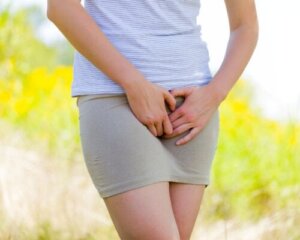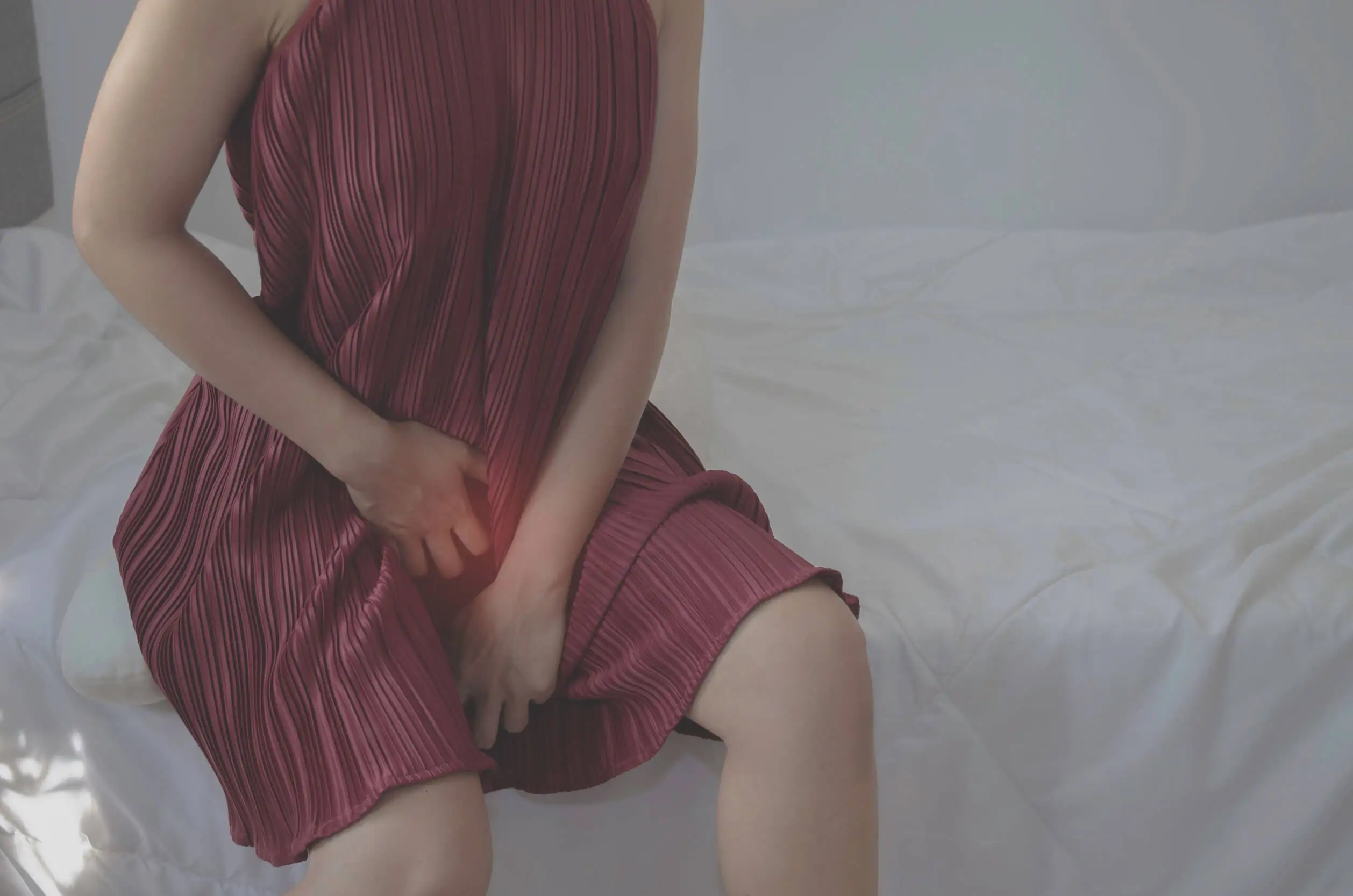Vulvar Dermatitis: Symptoms and Treatment


Reviewed and approved by the nurse Leidy Mora Molina
Vulvar dermatitis is an irritation of the skin in the intimate area, specifically in the folds surrounding the entrance of the vagina. It manifests with symptoms such as burning, redness and even discharge.
It can be caused by various factors, such as contact with irritating substances contained in hygiene products, as well as infections, rubbing from clothing, and some medications.
In many cases, it isn’t serious. Treatment includes the use of cream and oral medications, antibiotics, antifungal and antiallergic drugs, and some home care measures, under the supervision of a health professional.
What is vulvar dermatitis?
Dermatitis is a skin condition that causes inflammation, itching, scaling and redness. It can appear on various areas of the body, such as the hands, legs, feet, face, neck and abdomen.
There are several types of dermatitis, although a distinction is usually made between two major groups:
- Irritant contact dermatitis: Caused by irritating substances, present in cleaning or hygiene products, or others. The symptoms appear in the affected skin area and gradually disappear when contact ceases.
- Allergic contact dermatitis: Although it’s also caused by contact with a substance (allergen), this only occurs with people who are allergic to it and, unlike the previous one, it can spread to other areas of the body.
As for vulvar dermatitis, this term is used to refer to an irritation – with inflammation, itching and redness – that occurs in the skin surrounding the opening of the vagina.

It should be noted that in the folds of the vulva, the skin is extremely sensitive, as well as warm. It should always remain moist. All these conditions make it more susceptible to irritation or infection.
There are no precise figures regarding the incidence of this condition. Women of any age can suffer from it. However, it’s more likely to occur at certain times, particularly in adolescence, before the first menstruation, and post-menopause.
To learn more, take a look at this article: 5 Causes and 5 Symptoms of Vulvitis
Most common symptoms
In vulvar dermatitis, symptoms may vary with the cause. They include:
- Itching
- Burning or irritation
- Redness
- Rash
- Pain during sex
- General discomfort (when an infection is present)
- Fever (especially if STDs are present)
- A whitish discharge (when fungus is present)
- Blisters (less common)
Causes of vulvar dermatitis
This, like other irritations in the intimate area, may have to do with an infection, such as vaginitis. Such a disease develops when the microbiota of the area has been altered by a pathogen or for other reasons.
Secondly, the symptoms are associated with elements that, when in contact with the vulva, cause irritation or allergy. According to research, in a large number of cases, patients with this problem have an atopic history.
With regard to the causes of vulvar dermatitis, the following are generally noted:
- Skin conditions: psoriasis, eczema, or seborrheic eczema
- Lichen sclerosus
- Fungal infections: candidiasis and other yeast infections
- Sexually transmitted diseases
- Vaginitis and other bacterial infections
- Hormonal medications
- Hormonal changes and imbalances, particularly in menopause.
- Hygiene products or laundry detergents, with perfumes, irritants or substances that affect the pH balance of the skin
- The use of lubricants
- Inadequate or too frequent hygiene
- Rubbing of clothing
- Contact with synthetic fabrics in sensitive people
- An allergy to latex condoms
- Excess moisture in underwear
- Vulvar cancer
Another great article on a similar topic: 5 Calming Remedies for Vaginal Itching
Diagnosis and treatment

In some cases, symptoms may disappear on their own, improving hygiene or avoiding the elements that cause irritation. When they become more intense or persist for a week, it’s advisable to see a doctor.
Diagnosis is usually made by observation and anamnesis. If there are symptoms of infection, urine tests may be carried out, and, if cancer is suspected, a tissue biopsy may be required.
Once it’s known what is causing the vulvar irritation, treatment will be decided, which, of course, will depend on the cause. Some medications may be prescribed, such as antibiotics, antifungal or antiallergic. These can be applied in the form of creams or ointments, or orally.
There are also other measures that should be followed at home, taking into consideration the doctor’s recommendations. Among them, the following stand out:
- Wash once a day, with the water at room temperature, using a soap without perfumes.
- Dry the area well, but gently, without rubbing.
- Use moisturizers or lubricants if there’s dryness.
- Apply cold compresses to reduce discomfort.
- Abstain from sexual intercourse until symptoms disappear.
- Avoid scratching; this may make the discomfort worse.
Prevention measures
It isn’t always possible to prevent vulvar dermatitis, but some measures can be taken to reduce the chances of occurrence, especially in people prone to skin conditions.
For these purposes, the following actions are suggested:
- Don’t douche
- Don’t apply sprays or powder products
- Practice safe sex, using condoms.
- Wear loose-fitting, breathable, or moisture-absorbing clothing.
- For intimate underwear, choose natural fabrics (cotton).
- Don’t wash the vaginal area excessively.
- Avoid using intimate soaps with irritating substances.
- Don’t use hot water for this area.
- Change underwear frequently, especially if it’s sweaty after exercise.
- Wash your hands before touching the intimate area.
- Don’t share towels or underwear with friends or family members.
Warning signs
Be aware of certain warning signs that could indicate a more serious problem. Among these signs, it’s worth mentioning fever with chills, an abundant or foul-smelling vaginal discharge, a burning sensation when urinating, a noticeable swelling in the vulvar area, a sensation of heat in the area, and rashes that spread to other areas.
Finally, a very important recommendation: refrain from resorting to home remedies that can be found on Internet sites (especially washing of the intimate area). If in doubt, it is best to consult a doctor.
All cited sources were thoroughly reviewed by our team to ensure their quality, reliability, currency, and validity. The bibliography of this article was considered reliable and of academic or scientific accuracy.
- Crone A, Stewart E, Wojnarowska F, Powell S, Aetiological factors in vulvar dermatitis. Journal of the European Academy of Dermatology and Venereology, 2000; 14: 181-186.
- Cruz A, Salaman S. Dermatitis de contacto alérgica e irritativa en región vulvar. Impacto de los jabones íntimos. Rev Asoc Colomb Dermatol. 2019; 27(4): 239-258.
- Durán A, Victoria B. Patología vulvar en pacientes post-menopáusicas del Hospital Militar: un tamizaje con test de Collins. Rev. Colomb. Obstet. Ginecol. 1994; 45(2):151-159.
- Egan M, Lipsky M. Diagnosis of Vaginitis. Am Fam Physician. 2000; 62(5): 1095-1104.
- Kapila S, Bradford J, Fischer G. Vulvar Psoriasis in Adults and Children A Clinical Audit of 194 Cases and Review of the Literature. Journal of Lower Genital Tract Disease. 2012; 16(4): 364-371.
- Pichardo-Geisinger R. Atopic and contact dermatitis of the vulva. Obstet Gynecol Clin North Am. 2017; 44(3): 371-378.
- Rodríguez Cerdeira M, González Guerra E, Guerra Tapia A. Cáncer de vulva. Más dermatología; 2008; 4: 5-13.
- Vij A, Sood A, Piliang M, Mesinkovska NA. Infection or allergy? The multifaceted nature of vulvar dermatoses. Int J Womens Dermatol. 2015; 1(4): 170-172.
This text is provided for informational purposes only and does not replace consultation with a professional. If in doubt, consult your specialist.








